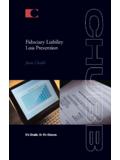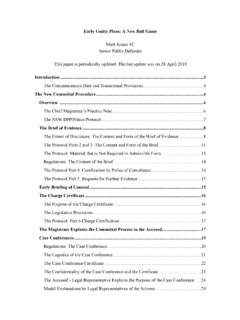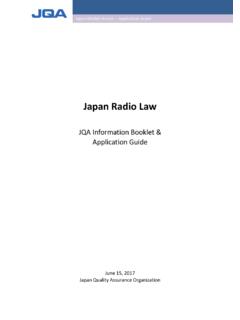Transcription of EU customs law - common issues import & export
1 16/12/20141EU customs law - common issues import & export Michael Lux, Attorney, presentation simplifies some issues for easier comprehension and can therefore not replace legal and obligations goods under a customs economic operator (AEO) and answers16/12 territory EU customs legislation applies only in the EU customs territory which is the territory of the 28 EU Member States to which certain territories are added ( Monaco), and from which certain territories are excluded ( the French overseas territories) EU fiscal legislation applies only in the fiscal territories of the Member States which are the national parts of the EU customs territory from which certain territories are excluded ( the Canary Islands)16/12 and obligations economic operators (1)The rights and obligations of economic operators and the EU customs authorities are mainly laid down in the customs Code and its implementing provisions:Economic operatorshave, inter alia, the following obligations: to notify, in advance, the arrival of the goods to the customs office of entry to lodge a customs declaration for goods brought into the EU customs territory and for goods to be brought out of this territory (in most cases, the declarant must be established in the EU.)
2 Consequently a foreign exporter must use a representative) to pay import duties in cases of release for free circulation or irregularities concerning goods for which the duties have been suspended16/12 and obligations -economic operators (2) to keep appropriate records of all import / export operations to make available to customs the required records and documents to ensure compliance with customs , tax, trade, agricultural, health and environmental legislation to lodge a guarantee where goods are released for free circulation with deferred payment or where duty liability is suspended16/12 and obligations economic operators (3)Economic operatorshave, inter alia, the following rights: to choose the customs procedure for the goods concerned to request a decision ( for binding tariff information, using a specific customs procedure, AEO status or a simplified procedure) to use a representative in dealing with the customs authorities direct representation: acting in the name of the person represented indirect representation.
3 Acting in one s own name but on behalf of someone else (the indirect representative is also liable for duties)Either type of representation and the person represented must be made known to the customs authorities to lodge an appeal to discharge one customs procedure by another ( customs warehousing by release for free circulation or re-exportation) to transfer dutiable goods to another place or another person16/12 and obligations customs authorities (1)The customs authoritieshave, inter alia, the following obligations: to accept a customs declaration which fulfils the formal requirements to release the goods for the procedure concerned where all the material requirements are fulfilled (this may include the need for prior authorisation) to grant an authorisation, or to take any other decision requested, where all the requirements are fulfilled to ensure compliance of economic operators, by performing controls on goods, supporting documents or records, or by imposing penalties not to disclose confidential information to other persons to apply duty relief and any other favourable treatment where this is requested and justified according to the legislation to honour decisions and other measures taken by the customs authorities of another Member State to cooperate with third countries where this is stipulated in an international agreement16/12 and obligations customs authorities (2)The customs authoritieshave, inter alia, the following rights.
4 To annul, revoke or amend decisions which were based on wrong information or do not comply with the law to request information and perform controls on goods, means of transport, persons, documents and records insofar as they relate to international trade in goods to request a guarantee for import duties, VAT and excise duties in cases where such duties are at stake to take identification measures ( sealing) to seize, confiscate, destroy or sell goods under certain circumstances of non-compliance16/12 goods under a customs procedure (1)Apart from free zones and temporary storage, goods can only be placed under a customs procedure by means of a customs declarationA customs declarationcan be lodged electronically (according to the specifications of the Member State concerned) in paper-based form ( Single Administrative Document, ATA carnet) where this is still allowed orally (mainly for travellers) by any other act ( passing the frontier, mainly for means of transport)For electronic and paper-based declarations, the following simplificationsmay be authorised.
5 Entry in the records followed by a notification and a periodic declaration simplified declarations followed by a periodic declaration (this is also possible with regard to a single incomplete declaration which is then followed by the supplementary declaration) deferred payment against a guarantee (the two previous simplifications are combined with deferred payment)16/12 goods under a customs procedure (2)The customs declaration is accepted if the goods have been presented ( their availability for controls has been notified) any authorisation or other document required is available the formal requirements of an electronic or paper-based declaration are fulfilledThe customs declaration, the goods and any supporting document may be controlled by customsIf duties are due, they must either be paid or guaranteedSubsequently, the goods are released for the procedure concerned if there is no obstacle due to prohibitions or restrictions 16/12 (1)Inprinciple, ,aneconomicoperatormaybeauthorisedtolodg ehiscustomsdeclarationattheplacewherehei sestablishedandtomakeavailablethegoodsfo rcontrolsatanotherplace(example:animport erinBerlindeclaresthegoodswhichhavearriv edattheportofRotterdam).
6 Advantages: Theimporterhastodealonlywithhisnationala dministrationinhisownlanguage Theestablishmentofacustomsdepartmentinth eotherMemberStateortheuseofarepresentati ve(withadditionalcost)canbeavoided Theuseofatransitprocedure(withadditional cost)canbeavoided16/12 clearance (2)Thoughcustomsdutiescanbepaidcentrally ,thisisnotthecasewithregardtoVATandexcis edutiesincaseswherethegoodsarenotdestine dfortheMemberStatewheretheimporterisesta blished( ,VATandexcisedutiesmustbepaidthere;ifthe goodsaredestinedforAustria,VATandexcised utiesmustbepaidthere)Anyprohibitionsandr estrictionsapplicabletothegoodsarecontro lled eitheronrequestofthesupervisingcustomsof fice(attheplacewheretheimporterisestabli shed), orattheinitiativeofthecustomsofficeofpre sentation(attheplacewherethegoodsarepres entedandwherethegoodsarereleased)16/12 clearance (3)Scenario 1: Goods entering in MS A are declared for free circulation in MS B (where the declarant is established) and end up in MS BMS BMS AEU customs TerritoryGoods flowInformation flowCustoms duties and VAT are declared and collected in MS B.
7 In MS A import VAT is waived if procedure code 42 is declared, given that an intra-EU supply takes place. MS A needs nevertheless information in order to be able to release the goods and to have proof that import VAT is Centralised clearance (4)Scenario 2: Goods entering in MS A are declared for free circulation in MS B (where the declarant is established) but the goods remain in MS AMS BMS AEU customs TerritoryGoods flowInformation flowThe customs and VAT declaration is available in MS B but the VAT data (including the amount of customs duty) are needed in MS A where the import VAT is collected; some MS combine the handling of customs duties and VAT (and therefore need to use deferred payment but will have to dissociate VAT payment from payment of customs duties) while other MS allow postponed accounting (so that payment of customs duties and VAT is dissociated anyway)144.
8 Centralised clearance (5)Scenario 3: Goods entering in MS A are declared for free circulation in MS B (where the declarant is established) and end up in MS CMS BMS AEU customs TerritoryGoods flowInformation flowMS CThe release for free circulation in MS A is exempt from import VAT if procedure code 42 is declared; the dispatch from MS A to MS C is VAT exempt as intra-EU supply. In MS C (which is not involved in the authorization for centralised clearance) VAT is due on an intra-EU acquisition. MS C is informed through the VAT information exchange system (VIES) of the VAT exempt supply from MS economic operator (AEO)ThegrantingofAEOstatusrequires: beingestablishedintheEU(exceptions:airli nes,maritimecarriers) recordofcompliance(asof1 May2016alsowithregardtotaxes) satisfyingsystemofmanagingrecords financialsolvency professionalqualifications(asof1 May2016) securityandsafetystandards(forfacilitati onsrelatingtosecurityandsafety)Thefollow ingbenefitsareavailabletoAEO: immediateaccesstoauthorisation-basedfaci litations notificationofcontrolspriortoarrival fewercontrols.
9 Controlscarriedoutasamatterofpriority mutualrecognitionwithcertaincountries(Ja pan,US,Switzerland,Norway) reducedguaranteefordeferredpayment(asof1 May2016) Centralisedclearanceandself-assessment(a sof1 May2016)16/12 the EU customs territory consist of the territory of its Member States? And how about the territory of Turkey? the customs and the fiscal territories (for VAT, excise duties) of the EU match? an importer or exporter use a representative in order to fulfil his obligations towards the customs authorities? an importer free to choose any customs procedure available for import goods? customs authorities free to decide whether and when they perform controls? forms of customs declarations exist? does "centralised clearance"mean? do you see as major benefit of being AEO? questions?6. principle, the EU customs territory consists of the territory of its Member States, including the 12-miles zone of their territorial waters.
10 In addition, Monaco is part of the EU customs territory, and some territories belonging to a Member State are excluded (complete list in Article 3 CC). Though the EU has concluded a customs union agreement with Turkey, both parties apply their own (albeit largely identical) customs legislation. However, customs formalities are applied for goods moving between both customs and fiscal territories of the EU match largely; however, there are some exceptions (complete list in Art. 6 (1) of Directive 2006/112/EC and Art. 5 (2) of Directive 2008/118/EC). importer or exporter is free to use a representative in his dealings with the customs authorities. However, in order to facilitate audits, he must keep records of his transactions (these records may, of course, be established and maintained by a service provider).







